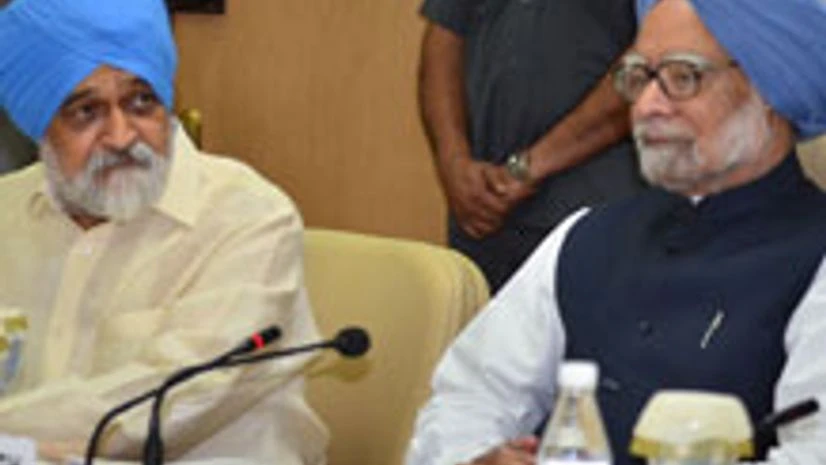Prime Minister Manmohan Singh on Wednesday stressed the need to reorient the Planning Commission to the changing requirements of the economy as some members raised the issue of poor industrial recovery, low corporate earnings and rising interest cost.
Singh, chairing the last internal meeting of the Commission under the government, said, "with an increasingly open and liberalised economy and a greater reliance on market mechanisms, we need to reflect on what the role of the Planning Commission needs to be."
Some officials said the Commission also discussed the poor economic growth in the first two years of the 12th five-year Plan (2012-13 to 2016-17) that could pull down average annual growth during the plan period to much below the projected eight per cent.
More From This Section
"Are we still using tools and approaches designed for a different era? Have we added functions and layers without any restructuring of the more traditional activities in the commission?" he asked, adding some challenges in implementation had arisen in the case of public-private-partnership projects, and these had to be addressed.
Singh, chairman of the Commission, highlighted the role the members had played in consensus-building. This, he said, was vital in the era of coalition governments. "Members have chaired inter-ministerial groups to resolve complex issues and this mechanism has helped immensely in resolving several inter-ministerial differences." Singh pointed to his long association with the Commission, which had started in 1980. He said in the 80s, the gross budgetary support (GBS) to the central Plan was Rs 15,000 crore, while the total GBS (including assistance to state Plans) was Rs 23,000 crore. This year, these are expected to be Rs 2 lakh crore and Rs 5.5 lakh crore, respectively. "Sometimes, I wonder about this massive expansion in resources and the impact this could have, if used effectively."
Road map for next Commission
Singh has urged all members to suggest their views, priorities, advice and road maps for the next Commission in a five-page note addressed to him before the tenure of the government comes to an end next month.
Members mentioned the sectors they had tried to make a difference in. B K Chaturvedi said in 10 years, access to power in rural India had risen to 80 per cent. In 2004-05, it was 55 per cent. He added in the roads sector, public-private partnerships had seen good progress. Pricing of liquefied petroleum gas and kerosene, however, had to be reviewed, he said.
On the overall economic environment, the members stressed the need to monitor geopolitical developments, specially in the wake of the crisis in Ukraine, as well as the coming monsoon. Deputy Chairman Montek Singh Ahluwalia said growth prospects of the economy would depend on the policies of the new government to be formed next month.
Rajeev Shukla, minister of state for planning, said the scheme for visa-on-arrival with 180 countries would become operational from October, adding this could double revenue from tourism. Shukla stressed the need to use social media to draw tourists.
Members said the quality of school education was a concern in the light of the Right to Education and the Rashtriya Uchchatar Shiksha Abhiyan. They also sought a review of labour laws.
On agriculture, members said while the National Democratic Alliance government could manage an average growth of 2.2 per cent, the UPA government had seen higher growth. "This was achieved despite a 13 per cent fall in the absolute agricultural workforce between 2004 and 2012," said a participant.
Members stressed the need to understand the impact of climate change on agriculture.
Member Mihir Shah said though the two terms of the UPA government had seen progress in growth and inclusiveness, programmes such as the Backward Region Grant Fund needed a review.

)
